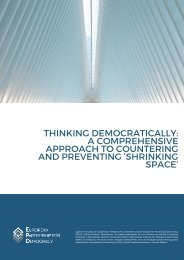Repression and resilience: Diagnosing closing space mid-pandemic
You also want an ePaper? Increase the reach of your titles
YUMPU automatically turns print PDFs into web optimized ePapers that Google loves.
28 REPRESSION AND RESILIENCE: DIAGNOSING CLOSING SPACE MID-PANDEMIC<br />
number of attacks <strong>and</strong> other forms of harassment against<br />
journalists. 101 102 620 press freedom violations linked<br />
to COVID-19 have been reported so far, ranging from<br />
arrests <strong>and</strong> unmotivated charges to violence, censorship,<br />
<strong>and</strong> surveillance. 103 Moreover, 20% of respondents in an<br />
ICFJ survey said their experience of online harassment<br />
was “much worse” during the p<strong>and</strong>emic. 104<br />
Judiciary<br />
Previous research has shown that judicial independence<br />
has been paramount to countering <strong>closing</strong> democratic<br />
<strong>space</strong> worldwide in recent years, making it a target of<br />
concerted efforts to weaken judicial integrity. 105 While<br />
temporarily paralised by social distancing measures<br />
<strong>and</strong> overburdened by case load, in some countries the<br />
judiciary managed to uphold constitutionalism in the face<br />
of attacks on democratic <strong>space</strong> during the p<strong>and</strong>emic. In<br />
El Salvador for instance, the Constitutional Court of the<br />
Supreme Court of Justice intervened in the executive’s<br />
illegal detention of citizens in ‘containment centres’.<br />
While the executive protested this decision, they ended<br />
up complying unwillingly with the call to stop violating<br />
fundamental rights. Similarly, Germany’s constitutional<br />
court upheld the right to protest under the p<strong>and</strong>emic<br />
as long as distancing measures were respected, 106 while<br />
courts in the United States successfully adjudicated an<br />
unprecedented number of fraud claims during the 2020<br />
Presidential election. 107<br />
On the contrary, in several countries with a politicised<br />
or partial judiciary branch, judicial institutions have<br />
struggled or failed to provide oversight <strong>and</strong> protect<br />
fundamental rights during the COVID-19 p<strong>and</strong>emic.<br />
In some cases, the p<strong>and</strong>emic was exploited to further<br />
compromise the judiciary, as was the case in Hungary 108<br />
<strong>and</strong> Argentina. 109 In other instances judicial institutions<br />
were unable to oversee executive decisions due to the<br />
sheer volume of decrees, forcing Courts to strategically<br />
choose the most important decrees for constitutional<br />
oversight. This had a big impact on civil society’s ability to<br />
counter attacks on democratic <strong>space</strong>, as an independent<br />
judiciary is in normal times a strong ally of civil society in<br />
upholding fundamental freedoms. Yet at a time when all<br />
oversight institutions were scrambling to adapt to a new<br />
reality such alliances were rare.<br />
Political parties<br />
While smaller political parties <strong>and</strong> democratic coalitions<br />
in parliaments were strong allies of civil society in<br />
defending democratic <strong>space</strong> before the p<strong>and</strong>emic, many<br />
of them were weakened by the crisis in their oversight<br />
<strong>and</strong> opposition roles. As decision-making was centralised<br />
in ruling parties through states of emergency, opposition<br />
parties found themselves ineffective <strong>and</strong> fragmented<br />
in their response. In countries where opposition parties<br />
were already fragmented before the p<strong>and</strong>emic, this<br />
defined their inability to counterbalance the government<br />
during the p<strong>and</strong>emic. In some cases where the<br />
opposition was relatively strong, as in Venezuela, they<br />
also lost significant following <strong>and</strong> momentum due to the<br />
101 UNESCO (2020): Journalism, press freedom <strong>and</strong> COVID-19. Available here.<br />
102 UNESCO (2020): Reporting facts: Free from fear or favour. Available here.<br />
103 International Press Institute: “IPI COVID-19 Press Freedom Tracker”. Dataset consulted on 9 April 2021. Available here.<br />
104 Posetti, J. et al. (2020): Journalism <strong>and</strong> the P<strong>and</strong>emic: A Global Snapshot of Impacts. Available here.<br />
105 European Partnership for Democracy & Netherl<strong>and</strong>s Institute for Multiparty Democracy (2020): Thinking democratically: a comprehensive<br />
approach to countering <strong>and</strong> preventing ‘shrinking’ <strong>space</strong>. Available here.<br />
106 CIVICUS (2020): Solidarity in the Times of COVID-19: Civil society responses to the p<strong>and</strong>emic. Available here.<br />
107 International IDEA (2020): Taking Stock of Global Democratic Trends Before <strong>and</strong> During the COVID-19 P<strong>and</strong>emic. Available here.<br />
108 Guasti, P. (2020): “The Impact of the COVID-19 P<strong>and</strong>emic in Central <strong>and</strong> Eastern Europe: The Rise of Autocracy <strong>and</strong> Democratic Resilience”.<br />
Democratic Theory, 7(2): 47–60. DOI:10.3167/dt.2020.070207.<br />
109 Alonso, L. (2020): “Argentina Under Covid-19: Extreme Lockdown, Rule by Decree <strong>and</strong> Judicial Politicization”. Available here.

















